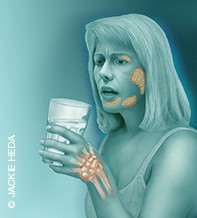Peer Reviewed
Feature Article Endocrinology and metabolism
An approach to the patient with a dry mouth
Abstract
Dry mouth is a common and disabling problem. After exclusion of treatable causes, treatment is symptomatic to prevent the consequences of salivary hypofunction, such as tooth decay and infection of the oral mucosa.
Key Points
- The subjective complaint of xerostomia needs to be differentiated from true salivary hypofunction.
- Salivary hypofunction can significantly reduce quality of life through its adverse effects on taste, mastication, swallowing, cleansing of the mouth, killing of microbes and speech.
- Salivary hypofunction is a substantive risk factor for dental caries, oral mucosal disease and infection, particularly oral candidiasis.
- Patients should be investigated for contributory and underlying causes, which include drugs and rheumatological diseases.
- Patients with salivary hypofunction can be treated with artificial saliva, moisturising gels, sugar-free lozenges or gums and muscarinic drugs (cevimeline, pilocarpine).
- Attention to maintaining and improving oral health is important, and treatment of consequent dental caries is essential.
Purchase the PDF version of this article
Already a subscriber? Login here.

